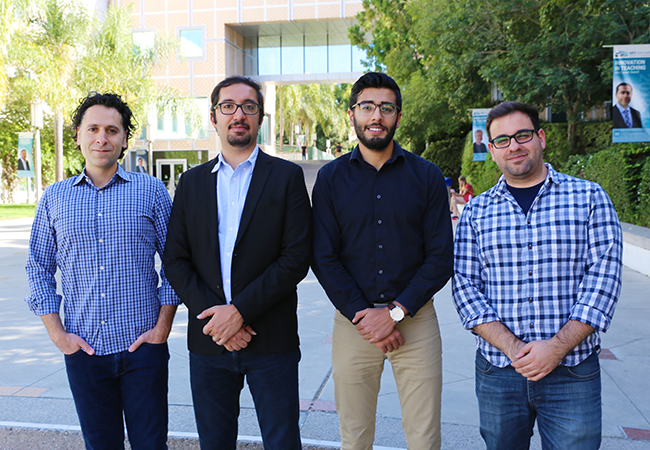
Oct.28, 2019 - Zak Kassas, Samueli School assistant professor of mechanical & aerospace engineering and electrical engineering & computer science, and his students won three best paper presentation awards at this year’s Institute of Navigation Global Navigation Satellite Systems Conference (ION GNSS+), held last month in Miami, Florida.
The first paper, co-authored by Kassas, director of UC Irvine’s Autonomous Systems Perception, Intelligence, & Navigation (ASPIN) Laboratory, and doctoral candidate Joe Khalife, was titled Assessment of Differential Carrier Phase Measurements from Orbcomm LEO Satellite Signals for Opportunistic Navigation. The paper presented a novel framework for global positioning with differential carrier phase measurements from low Earth orbit (LEO) satellites. Experimental results on an unmanned aerial vehicle (UAV) showed the UAV positioning itself exclusively with this framework with an accuracy that is orders-of-magnitude more accurate than any previously reported results.
The second paper was co-authored with doctoral student Ali Abdallah. Titled Indoor Localization with LTE Carrier Phase Measurements and Synthetic Aperture Antenna Array, the paper presented a new indoor localization system with cellular long-term evolution (LTE) signals. Results represented the most accurate-to-date for indoor positioning exclusively with cellular LTE signals and no additional sensors.
The third paper, UAV Integrity Monitoring Measure Improvement using Terrestrial Signals of Opportunity, was co-authored with postdoctoral researcher Mahdi Maaref. It presented an innovative method to improve the integrity measures of a UAV by exploiting ambient terrestrial signals of opportunity, for example, cellular, digital television and AM/FM radio signals. Integrity refers to the system’s ability to detect anomalies and warn the user when the system should not be used. Experimental results to evaluate the performance of the developed method showed improvement of more than 57% compared to GPS only for a UAV navigating in an urban environment.
“I’m very proud of the accomplishments of my students and postdoctoral researcher. Their papers were presented in competitive sessions at the conference, which comprised papers from noteworthy research groups,” said Kassas. “ASPIN’s research continues to push the scientific limits and establish new standards for autonomous vehicle navigation, and I am grateful for the support of the Office of Naval Research, National Science Foundation, and National Institute of Standards and Technology for believing in our vision and supporting our research.”
- Anna Lynn Spitzer
